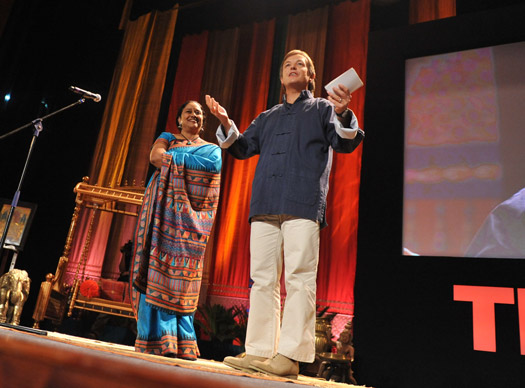Photo: Lakshmi Pratury and Chris Anderson at TEDIndia, Session 1, “Fast Forward,” November 5, 2009, in Mysore, India. Credit: TED / James Duncan Davidson
A round-up from the thunderous first session of TEDIndia:
Usha Uthup‘s mesmerizing voice rings in the first day of TEDIndia magic —
Lakshmi Pratury, curator of TEDIndia, kicks off the first session with a poem by Rabindranath Tagore:
Where the mind is without fear and the head is held high;
Where knowledge is free;
Where the world has not been broken up into fragments by narrow
domestic walls;
Where words come out from the depth of truth;
Where tireless striving stretches its arms towards perfection;
Where the clear stream of reason has not lost its way into the
dreary desert sand of dead habit;
Where the mind is led forward by thee into ever-widening thought
and action–
Into that heaven of freedom, my Father, let my country awake.
Hans Rosling recalls being a schoolchild, in Sweden, in awe of how his Indian peers excelled beyond him. This humbling experience changed his life — and revealed to him that India would advance in the world at a breakneck pace. He predicts Asia will (once again) become the dominant part of the world in the next century. He shows statistics animation that compares the income growth of the U.S., U.K. and Japan with China and India: the latter two are quickly catching up. But internal social inequalities are the major barriers to that happening. He concludes, to applause, that July 27th, 2047 is the exact date India will catch up with the U.S. Standing ovation. Read more about Hans Rosling >>
Devdutt Pattanaik shares the “business of mythology”: what our mythologies reveal about our practices. They shape our thinking — and the course of history. (Myth begets corporate rituals, too.) The myth of the deity Ganesha racing around the world against his brother, Karttikeya, where one circles “the world” and the other “my world,” helps us understand differences in viewpoints — and clashes of civilizations. The Western myth of Theseus tells us to be heroic and spectacular, to conquer the world. Krishna, a myth from India, teaches that “nothing lasts forever — not even death.” Understanding these constructs of “one” versus the “infinite” helps us prosper, globally. Visit Devdutt Pattanaik’s website >>
Marc Christensen says, “Go fail with a child.” As kids, we are taught only how to succeed — but we need to be taught how to fail, too. If we experience failure, and see others fail, we learn the courage to overcome the fear of it — and realize that failures are only stepping stones toward success.
Mallika Sarabhai‘s wild characterizations show how theater and performance art can bridge cultural gaps, making the whole world aware of injustices such as poverty and violence, and create global social change. Visit Mallika Sarabhai’s website >>
Usha Uthup returns to the stage to bring the house down at the end of Session 1 with a rousing medley of popular songs, in several languages, from all around the world. Standing ovation. Encore. Visit Usha Uthup’s website >>
More TEDIndia coverage:
Comprehensive TEDIndia coverage >>
Read minute-to-minute updates on the TEDNews Twitter feed >>

Comments